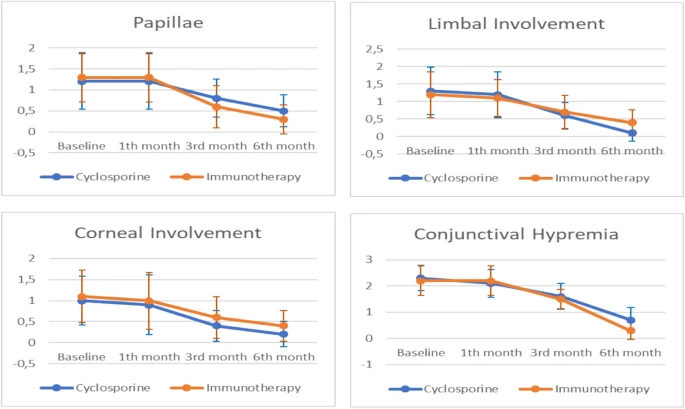Abstract
Purpose
Symptom control in the long-term with less side effects is important in perennial allergic conjunctivitis, since would improve quality of life. This study aimed to assess the clinical efficacies of topical cyclosporin A and subcutaneous allergen immunotherapy (SCIT) in terms of sign control in perennial allergic conjunctivitis.
Methods
This retrospective study included 20 adult patients with perennial allergic conjunctivitis and confirmed sensitization to house dust mites with skin prick test.
Patients were assigned to either topical cyclosporine A treatment or SCIT. The participants were followed for 6 months, and signs scores were recorded at 1, 3 and 6 months.Results
Overall, both cyclosporine and immunotherapy groups showed significant improvements in papillary reaction (p = 0.011 and 0.003, respectively), limbal involvement (p = 0.031 and 0.001), and conjunctival hyperemia (p = 0.001 and p < 0.001) scores during the 6-month follow-up. However, only cyclosporine group showed a significant improvement in corneal involvement scores (p = 0.015) during the study period. When scores at different time points were compared, significant improvement in conjunctival hyperemia was evident at 6 months in both groups when compared to baseline (cyclosporine group, 0.7 ± 0.68 vs. 2.4 ± 0.84, 70.8% decrease, p = 0.01; immunotherapy group, 0.3 ± 0.48 vs. 2.3 ± 0.95, 87.0% decrease, p = 0.004), whereas for limbal involvement such an improvement was only evident in the immunotherapy group (0.1 ± 0.32 vs. 1.3 ± 0.95, 92.3% decrease, p = 0.01).
Conclusions
Allergen immunotherapy and cyclosporin A treatment may provide effective sign relief in perennial allergic conjunctivitis. It may represent an encouraging treatment option particularly for cases with perennial allergic conjunctivitis refractive to other treatments and positive skin prick test to a specific allergen (house dust in the present study). Long-term relief by SCIT would reduce the side effects of polypharmacotherapy. Larger studies with longer follow-up are warranted to confirm our findings.


No comments:
Post a Comment